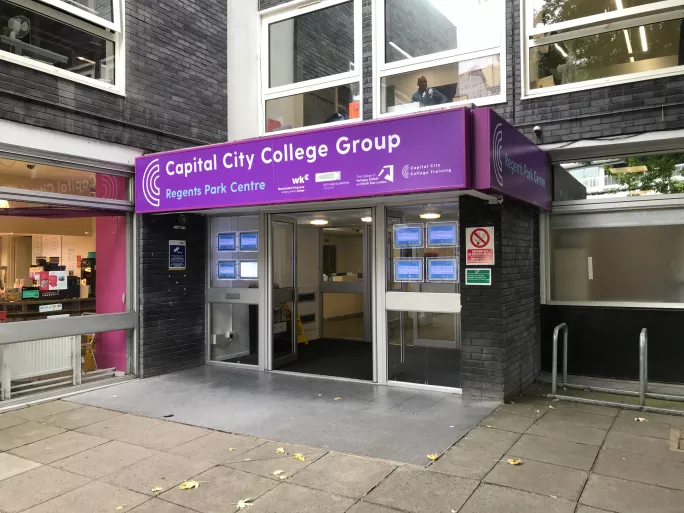- Home
- Despite Covid-19, budgets are on track, says CCCG boss
Despite Covid-19, budgets are on track, says CCCG boss

In early March, Roy O'Shaughnessy, chief executive of Capital City College Group (CCCG), told Tes that 2020 was going to be the group’s toughest year yet.
That was before the true impact of coronavirus on our education system was fully realised – the fall-out has challenged college leaders and staff across the world in a myriad of ways.
But CCCG had been facing huge challenges for months before the virus outbreak. In December 2019, the college group revealed that it was facing a deficit of almost £10 million, instead of the £750,000 surplus it had originally budgeted for in 2018-19. At the end of February, Ofsted rated the group as “requires improvement”.
Coronavirus: Three-quarters of colleges have furloughed staff
Background: College group CEO takes 5 per cent pay cut
Must read: 'In lockdown, there have been wonderful highs'
Still, O'Shaughnessy told Tes that he wanted the group to break even by 1 August this year. And while that was already a huge undertaking, it has since become one that may seem impossible under the circumstances.
“In March we were pretty sure we could probably end up within £2.6 million of where we needed to be. I'm very pleased to say that even allowing for Covid-19, the business-as-usual budget has stayed absolutely on track,” says O'Shaughnessy.
The impact of coronavirus on colleges
But the group is estimating “up to £2 million” in coronavirus-related costs this year: colleges have lost money due to the closure of the popular campus restaurants and a loss of funding to deliver apprenticeships. This, O'Shaughnessy says, is being tracked separately to the already existing deficit.
When it comes to the original deficit, the group is on track to deliver on the promises made. But the coronavirus costs will only get greater next year, he says.
“Next year, we anticipate about £6 million in lost income directly due to Covid-19 because of the apprenticeships, restaurants, commercial and international," O'Shaughnessy explains.
“We're not really seeing things being close to normal until January of next year. There will be a gradual feed back in, but probably the international will only come back in a year this summer.
“But even allowing for that £6 million loss, that is not guaranteed by the government or anything like that, it is really on our own heads. We are still predicting to break even next year, which I think is a massive accomplishment of the staff."
A three-part plan
The college group is planning to tackle these predicted losses much in the same way that it is recovering the current debt: with a three-part plan.
First of all, the group is attempting to lower the rate of students dropping out early on, to guarantee the maximum amount of funding available from the Education and Skills Funding Agency.
Next, the group plans to generate money from its estate. Westminster Kingsway College’s Regent's Park Centre is worth around £60million. CCCG doesn’t intend to sell it but develop it and make it a profitable building. There are currently three architects competing to come up with designs for the building.
“Ideally, we would want to own that building in its entirety and do the development through our own sources,” says O'Shaughnessy. “That then allows us to create a £60 million minimum endowment for the college going forward.”

These plans have been slowed down slightly due to coronavirus – the group was planning to apply for planning permission from Camden council to build an extra 16 floors, but this is likely to be delayed for around six months. But the college is still driving the plans forward, says O'Shaughnessy.
The third part of the plan has also been hit by the pandemic: to develop college-owned, college-run businesses for profitable purposes. The group already has a training arm up and running – Capital City College Training – which is continuing to run as usual despite the current operating environment. The new commercial entities that will “capitalise on corporate opportunities” are “a work in progress”, says O'Shaughnessy.
“Their development is continuing in line with our thinking, but they are not yet operational. Given the current environment, we will need to take a more considered investment approach, but we have no reason at the moment to think they will not progress to be a success,” he says.
'Well-placed' to tackle the challenge
As colleges across the UK take a hit on their self-generated income, many are furloughing staff who are eligible under the Department for Education’s guidelines. So far, CCCG has furloughed three staff – but O’Shaughnessy is keen to stress they are receiving 100 per cent of their salary, and the college group went through a consultation process before this was taken forward.
He believes that, actually, the challenges CCCG already faced meant it was well-placed to tackle the impact of coronavirus.
“Yes, we thought we were in a difficult year. My stress level was actually far greater pre-Covid-19 than it is today because it turned out that most of our systems all turned out to be robust. Many of the things we were projecting about finances, we've been absolutely spot on about. So for us, there's been some quite buoyant news and all of this despite, and obviously in a very serious challenge,” he says.
Prior to the coronavirus crisis, O’Shaughnessy admitted he had sleepless nights about the solvency of the college group – talking about the huge responsibility that he personally felt in steering the group out of the deficit. Add to that the stress of dealing with the impact of coronavirus on thousands of staff and students, and the burden becomes huge.
“This job was always very stressful, right? I mean, from the day I walked in, it was a lot more stressful than I thought it was going to be. I didn't have specific FE experience and then facing not only the cultural issues, but the financial issues, and then having the pressure of a new Ofsted framework coming, and the FE commissioner paying you a visit.
“So it’s a stressful job anyway. And the Covid-19 was interestingly not a stress in the same way as that. For me, Covid-19 was about how we actually dealt with this in a community setting, and was actually far more about protecting the staff and the learners.
“And those other issues which seemed absolutely so important became secondary in the sense of making sure first and foremost that staff weren't going to die because we didn't close too early, and that learners were being protected.”
Consistency in education
Creating consistency in the education offered across all five of the group’s institutions was a necessity for O’Shaughnessy pre-coronavirus: CCCG’s Ofsted report highlighted that although there were good pockets of practice – for example, Westminster Kingsway’s award-winning college restaurant – there was much to be improved.
However, maintaining education consistency, let alone building it, is tough in these times. Lecturers are in touch with learners daily – but there is only so much work that can be completed at home. For many, practical work is impossible.
But the lecturers at CCCG, like many others around the country, have been inventive. As well as moving provision online, they are hosting a range of webinars for students to engage with. At Westminster Kingsway College, learners are set to benefit from the expertise of those at Goldman Sachs about what degree apprenticeships can offer, and experts at Queen Mary University of London about budgeting and finances while studying for a degree. Successful alumni, too, are taking part in the webinars, sharing their routes into the way of work and experiences.
Gary Hunter, vice-principal of Westminster Kingsway College, says that a group-wide student survey about remote learning was key to shaping its provision.
“One of the strong factors that came back was the need to have one-to-one support online. Across the group, we really increased our one-to-one tutorial support where possible, so that students feel supported.
“For us to turn around our delivery of teaching and learning to 100 per cent online in the space of a week or so has been extraordinary, especially for the amount of students that we have and teachers that we have here as well,” he says.
O’Shaughnessy is clearly proud of how the group has come together in this crisis – and it’s that sense of teamwork that he wants to drive forward as it goes on to tackle the other challenges it faces.
“Since we've had to deal with this crisis, everybody has come together: union members, staff learners, senior leaders, governors, local authorities – everybody is trying to do the right thing and it’s about trying to capture that intent and taking that forward,” he says.
“So often people only look to self protect themselves. Whereas this crisis is so much bigger: it's only if we look after one another, that we actually look after ourselves.”
Keep reading for just £1 per month
You've reached your limit of free articles this month. Subscribe for £1 per month for three months and get:
- Unlimited access to all Tes magazine content
- Exclusive subscriber-only stories
- Award-winning email newsletters



